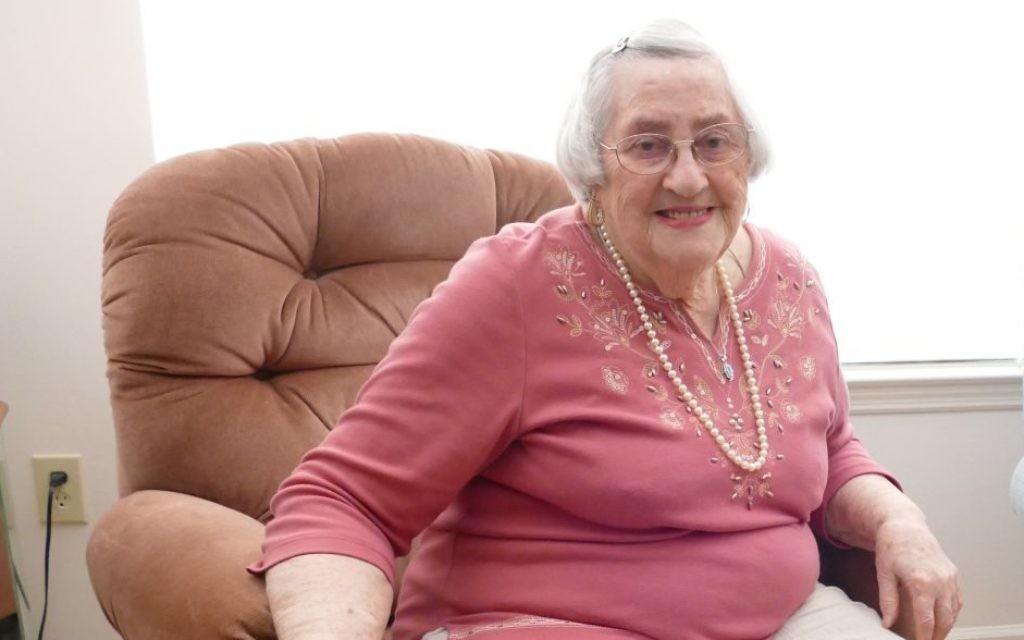Memorial Speaker Triumphs With Testimony, Joy
Holocaust survivor Helen Weingarten won't let anyone deny the history she lived at Auschwitz and beyond.
Not many Jews today can remember Josef Mengele, Auschwitz’s notorious “Angel of Death,” putting his hands on them and spinning them around to judge their fate.
Among that select few, perhaps only one can also say she has an 8-year-old great-granddaughter who is a professional baker, making cakes for simchas in Florida.
That one, Helen Weingarten, who celebrated her 94th birthday just before Passover, is the featured speaker at the Yom HaShoah commemoration Sunday, April 15, at the Memorial to the Six Million.
Get The AJT Newsletter by email and never miss our top stories Free Sign Up
“People have to know what happened to me, what happened with the Holocaust, because it happened to me, and I want them to make sure they know it happened,” she said in an interview in her Hammond Glen apartment. “I’m here alive to tell what happened to me. … I cannot forget a day from Auschwitz, I can’t.”
When the native of Romania delivers her address, you can expect to follow her through the extremes of human cruelty and joy.
The Nazis killed Weingarten’s parents, half of her eight siblings, and her nieces and nephews. Another sister likely would have died at Auschwitz, but Weingarten pulled her into a different line when Mengele and the guards weren’t looking, Weingarten said.
She spent 180 days at Auschwitz, starting in May 1944, and she knew her end had arrived when she was among 500 women selected by Mengele and marched toward the gas chambers — until an SS officer drove up and announced that the group was needed for factory labor.
For the second time, Weingarten was crammed into a cattle car for a five-day train journey. At the end, she found herself making airplane motors in Nuremberg.
“Overnight I became an engineer,” she said with a smile, finding the humor in a life-or-death situation: She and the other women were warned that if the motors didn’t work and the planes didn’t fly, they would be killed. They also faced frequent Allied air raids.
After three months, Weingarten was moved to another factory to make metal plates that looked like hatchet blades.
By April 1945, as the U.S. Army was advancing, the Nazis wanted to move the women again, but they refused.
“We said, ‘If you want to kill us, kill us here,’” Weingarten said. The result was a stalemate that lasted until the Allied troops arrived three days later.
Postwar, she and her sisters stayed together in a Bavarian town, Rehau, where they learned that their younger brother, whom Weingarten had thought was on a truck she saw driving toward the gas chambers early in her time at Auschwitz, had survived as well.
In Rehau she also met her future husband, Jack, a survivor from Poland. They married in 1946 and had the first of two children, and, thanks to special expansion of refugee limits enacted by President Harry Truman after his surprise election in 1948, the family immigrated in 1949 to Ohio, where an uncle lived. All her surviving siblings also made it to America.
Weingarten, who went to high school as an adult and got her diploma in 1968 — she remembers it was the year that Martin Luther King Jr. died — first talked about her Holocaust experience when a student, a customer in her seamstress business, asked to interview her for a school project. She didn’t know if she could do it, but once she started talking, she couldn’t stop. That girl got an A, as did others who interviewed her, Weingarten said.
She has volunteered to speak to school groups at the Breman Museum since moving to Atlanta from Florida nine years ago to be near her daughter. She used to speak to several groups a week, sometimes two a day, but Rabbi Joseph Prass, the interim director of the Weinstein Center for Holocaust Education, said the museum has cut her back to two or three times a month to give others a chance.
Whenever she talks, Weingarten and Rabbi Prass agree, the students are silent, hanging on every word. She has presented at the Breman’s “Bearing Witness” program a couple of times, and the museum made a video of her story.
“It is my responsibility to tell the people what happened in the Holocaust, and I am here to tell you, all of you, that I went through it, and it happened, and I don’t want this to happen again to nobody,” Jewish or not, she said.
The only thing that might be more important is her family, her triumph over Mengele and the Nazis, including a little Florida baker named Miranda who’ll turn 9 this spring.
What: Community Yom HaShoah service
When: 11 a.m. Sunday, April 15
Where: Memorial to the Six Million, Greenwood Cemetery, 1173 Cascade Circle, Southwest Atlanta
Admission: Free; www.thebreman.org/Events/04-15-2018-Yom-HaShoah





comments